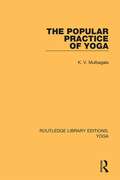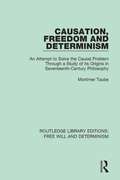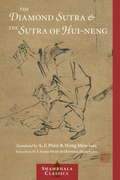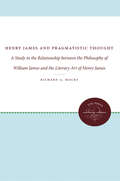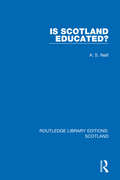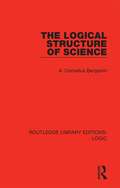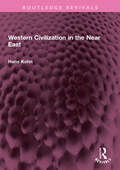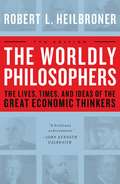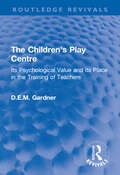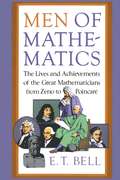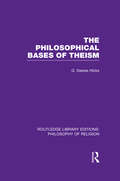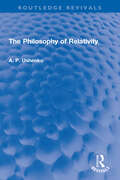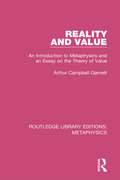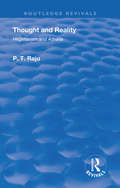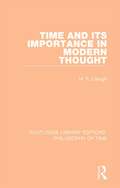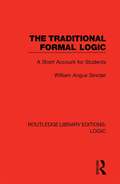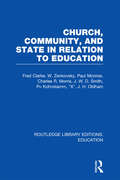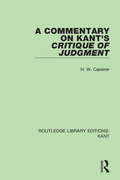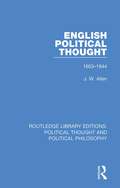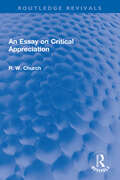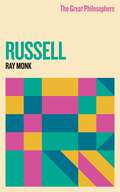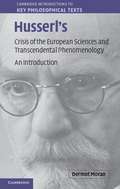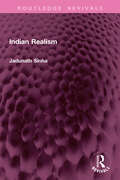- Table View
- List View
The Popular Practice of Yoga (Routledge Library Editions: Yoga #6)
by K.V. MulbagalaThis book, first published in 1935, is an early western study of the practice of yoga. It examines the theories of yoga, and attempts to understand and explain its philosophy and beliefs.
Causation, Freedom and Determinism: An Attempt to Solve the Causal Problem Through a Study of its Origins in Seventeenth-Century Philosophy (Routledge Library Editions: Free Will and Determinism #1)
by Mortimer TaubeThis book, first published in 1936, divides into roughly two parts: a re-examination of historical material; and a positive theory of causation suggested by the results of this re-examination. The historical study discloses an ambiguity in the meanings of causation and determinism; it discloses also that this ambiguity is transferred to the meaning of freedom.
The Diamond Sutra and The Sutra of Hui-neng
by A F Price Christmas Humphreys W.Y. Evans-Wentz Wong Mou-LamThe Diamond Sutra, composed in India in the fourth century CE, is one of the most treasured works of Buddhist literature and is the oldest existing printed book in the world. It is known as the Diamond Sutra because its teachings are said to be like diamonds that cut away all dualistic thought, releasing one from the attachment to objects and bringing one to the further shore of enlightenment. The format of this important sutra is presented as a conversation between the Buddha and one of his disciples. The Sutra of Hui-neng, also known as the Platform Sutra, contains the autobiography of a pivotal figure in Zen history and some of the most profound passages of Zen literature. Hui-neng (638-713) was the sixth patriarch of Zen in China, but is often regarded as the true father of the Zen tradition. He was a poor, illiterate woodcutter who is said to have attained enlightenment upon hearing a recitation of the Diamond Sutra. Together, these two scriptures present the central teaching of the Zen Buddhist tradition and are essential reading for all students of Buddhism.
Henry James and Pragmatistic Thought: A Study in the Relationship between the Philosophy of William James and the Literary Art of Henry James
by Richard A. HocksThis brilliant new study is the first comprehensive and penetrating exploration of the complex and important aesthetic and intellectual relationship between the Jameses. Hocks relates organically what William thought to how Henry thought, and his convincing argument becomes a profound examination of Henry's mind and the way in which his work dramatized a particular philosophical attitude through its unique and felicitous style.Originally published in 1974.A UNC Press Enduring Edition -- UNC Press Enduring Editions use the latest in digital technology to make available again books from our distinguished backlist that were previously out of print. These editions are published unaltered from the original, and are presented in affordable paperback formats, bringing readers both historical and cultural value.
Is Scotland Educated? (Routledge Library Editions: Scotland #21)
by A. S. NeillOriginally published in 1936, and with more than a slightly tongue-in-cheek tone at times, the author of this book declares that Scotland is not educated but merely learned. This book does not deal with education in its narrowest sense: it ranges from the Kirk to Haggis, Tartans and Burns, Whisky and repressed sex in its discussion, proclaiming Calvinism as the root of most of Scotland’s evils. Honest and at times provocative, this volume does give direct access to the emotional roots of Neill’s feelings about Scottish education.
The Logical Structure of Science (Routledge Library Editions: Logic)
by A. Cornelius BenjaminThis book addresses the argument in the history of the philosophy of science between the positivists and the anti-positivists. The author starts from a point of firm conviction that all science and philosophy must start with the given… But that the range of the given is not definite. He begins with an examination of science from the outside and then the inside, explaining his position on metaphysics and attempts to formulate the character of operational acts before a general theory of symbolism is explored. The last five chapters constitute a treatise to show that the development from one stage of symbolismto the next is inevitable, consequently that explanatory science represents the culmination of knowledge.
Western Civilization in the Near East (Routledge Revivals)
by Hans KohnFirst published in 1936, Western Civilization in the Near East traces the spread and growth of Western civilization in the countries of the Levant and their immediate hinterland. The author argues that modern civilization took birth in Western Europe and then slowly spread to the rest of Europe and to all other parts of the earth, leading to the Europeanization of mankind. While Europe’s modern civilization initially enabled it to dominate the world economically and political, it also provided non-European people with the resources to ultimately resist and reject Europe’s control. This universal acculturation and the ensuing birth of a coherent and closely-knit humanity, facing similar social, economic, and cultural problems determined the new trends of world history. This book only focuses on the European contact with the Muslim East and the consequences of the contact. The language used is a reflection of its era and no offence is meant by the Publishers to any reader by this republication. This book will be of interest to students of history, political science, international relations, and geography.
The Worldly Philosophers
by Robert L. HeilbronerThe Worldly Philosophers is a bestselling classic that not only enables us to see more deeply into our history but helps us better understand our own times. In this seventh edition, Robert L. Heilbroner provides a new theme that connects thinkers as diverse as Adam Smith and Karl Marx. The theme is the common focus of their highly varied ideas -- namely, the search to understand how a capitalist society works. It is a focus never more needed than in this age of confusing economic headlines. In a bold new concluding chapter entitled "The End of the Worldly Philosophy?" Heilbroner reminds us that the word "end" refers to both the purpose and limits of economics. This chapter conveys a concern that today's increasingly "scientific" economics may overlook fundamental social and political issues that are central to economics. Thus, unlike its predecessors, this new edition provides not just an indispensable illumination of our past but a call to action for our future.
Beyond Tragedy: Essays on the Christian Interpretation of History
by Reinhold NiebuhrThis book is intended to present Niebuhr's ideas about "Christian Realism" in a way thatwill be useful to people who are thinking about today's social issues.
The Children's Play Centre: Its Psychological Value and its Place in the Training of Teachers (Routledge Revivals)
by D.E.M. GardnerFirst published in 1937, The Children’s Play Centre is an account of Gardner’s Play Centre and her work in assessing its value in the education of children and the training of teachers. The book puts forward the value of play in the development of children and provides a detailed report of Gardner’s experiment. It also explores the significance of the Play Centre to the technique of training students. It will have lasting relevance for those interested in the history of education and the psychology of education.
Men of Mathematics
by E. T. BellHere is the classic, much-read introduction to the craft and history of mathematics by E.T. Bell, a leading figure in mathematics in America for half a century. Men of Mathematics accessibly explains the major mathematics, from the geometry of the Greeks through Newton's calculus and on to the laws of probability, symbolic logic, and the fourth dimension. In addition, the book goes beyond pure mathematics to present a series of engrossing biographies of the great mathematicians -- an extraordinary number of whom lived bizarre or unusual lives. Finally, Men of Mathematics is also a history of ideas, tracing the majestic development of mathematical thought from ancient times to the twentieth century. This enduring work's clear, often humorous way of dealing with complex ideas makes it an ideal book for the non-mathematician.
The Philosophical Bases of Theism (Routledge Library Editions: Philosophy of Religion)
by George Dawes HicksExcellently organised and written, this is a thorough examination of how philosophy interacts with religion. The chapters were originally presented as the Hibbert Lectures in 1931 at University College London and the University of Manchester. The texts are expanded and elaborated to present a cohesive text, first published in 1937. Exploring free rational thinking, the book encourages reflection on the principals on which religion rests and addresses themes such as knowledge and experience, evolution, positivism, mystical experience, divine immanence, beauty and morality.
The Philosophy of Relativity (Routledge Revivals)
by A. P. UshenkoFirst published in 1937, The Philosophy of Relativity contains an exposition of Einstein, a step-by step deduction of the main equations of both the special and general theories of relativity. This book sets out to expound an original theory of events, change and space-time, and to offer a new explanation of perception. But in order to ramify his belief in the objective reality of space and time, the author digresses into problems of general interest such as cognitive significance of art and Zeno’s paradoxes. He also defends his theory in an appraisal of the fashionable views of logical positivism and pragmatism. This book is a must read for scholars and researchers of philosophy of science and philosophy in general.
Reality and Value: An Introduction to Metaphysics and an Essay on the Theory of Value (Routledge Library Editions: Metaphysics)
by Arthur Campbell GarnettOriginally published in 1937. This book addresses the importance of the theory of values that rests on a general metaphysical understanding founded on a comprehensive view of all aspects of the world. The author speaks against the absolutist theories with a realistic one encompassing a theory of space and time and considering value as an object of immediate intuition. These great philosophical questions feed into discussions of the philosophy of religion and of science. Garnett distinguishes between spiritual and other values on the ground that the spiritual values are not subjective to satiety, while other values are. He contends that our knowledge of mind is as direct and reliable as our knowledge of the physical world. This is an important early book by an influential 20th Century thinker.
Revival: Thought and Reality - Hegelianism and Advaita (1937)
by Poolla Tirupati RajuThis work is a contribution to certain aspects of idealistic philosophy. It is a comparative study, yet it is not a comparison for the sake of comparison. This book examines the supra-rational Absolutism of the West developed under the Hegelian influence, and in the light of the criticisms shows the peculiar character of the Advaita Vedanta of Sankara. It is therefore not a mere exposition, but a criticism and construction. The discussions are not cosmological, but epistemological and metaphysical, approached from the side of logic. The work may also be viewed as a reorientation of Sankara's system. It places Sankara’s philosophy in line with the idealistic philosophies of the West, so that we can understand the peculiarities of the former in terms of the latter. It thus discovers or brings into clearer light the guiding principle of Sankara’s thought. It brings out the full significance of the principles of non-contradiction applied by Sankara as a test of truth and reality, and shows its difference from the same principle as understood by Hegel and the Hegelians. The aim of this work is to attempt at laying the metaphysical foundation of the logic of supra-rational Absolutism, the interpretation of Advaita is based mostly on polemical works.
Time and its Importance in Modern Thought (Routledge Library Editions: Philosophy of Time #1)
by M. F. CleughOriginally published in 1937. This book is a classic work on the philosophy of time, looking at the pshychology, physics and logic of time before investigating the views of Kant, Bergson, Alexander, McTaggart and Dunne. The second half of the book contains more indepth consideration of prediction, the concepts of past and future, and reality.
The Traditional Formal Logic: A Short Account for Students (Routledge Library Editions: Logic)
by William Angus SinclairOriginally published in 1937. A short account of the traditional logic, intended to provide the student with the fundamentals necessary for the specialized study. Suitable for working through individualy, it will provide sufficient knowledge of the elements of the subject to understand materials on more advanced and specialized topics. This is an interesting historic perspective on this area of philosophy and mathematics.
Church, Community and State in Relation to Education: Towards a Theory of School Organization (Routledge Library Editions: Education)
by Fred ClarkeThis volume was originally prepared for the World Conference on Church, Community and State held in Oxford in 1937. Its aim was to understand the nature of the vital conflict between the Christian faith and the secular tendencies of the early twentieth century, particularly in relation to education. The book also analyses the responsibilities of the Church in this struggle.
A Commentary on Kant's Critique of Judgement (Routledge Library Editions: Kant)
by H. W. CassirerThis book expounds Kant's Critique of Judgement by interpreting all the details in the light of what Kant himself declares to be his fundamental problem. Providing an excellent introduction to Kant's third critique, it will be of interest to students of philosophy.
English Political Thought: 1603-1644 (Routledge Library Editions: Political Thought and Political Philosophy #1)
by J. W. AllenFirst published in 1938. A study of the political doctrines and events which led to a hardening of lines between the Royalists and the Parliamentarians. "From the March of 1604, when James I met his first Parliament to the assembly of the Long Parliament in November 1640, there was going on a conflict between irreconcilable views concerning the constitution of government in England. It was concerned with what had been and with what was and, necessarily, with what should be." By 1640 the question soon would be "how stable government could ever again be established . . . But the confusion, if it produced little else of value, produced a ferment of thought." And this ferment has had an incalculable effect on the centuries which have followed. Among the many topics discussed, on the basis of firm knowledge and with reasonableness, are the King and the nature of his claim, the parliamentary opposition and its conceptions and the possibility of compromise, the approach to Toleration, Puritanism and the Laudian Church, and the final collapse of government.
An Essay on Critical Appreciation (Routledge Revivals)
by Ralph W. Church dec'dFirst published in 1938, An Essay on Critical Appreciation aims to provide a language suited for the explication on beauty. This explication is not based merely on emotion but is motivated by contemplation and discrimination. By virtue of being rendered in a discourse, an appreciation can claim to be critical or discriminating and ‘beauty’ can be said to have characteristics. The search of such a language takes the author through the contemplation on the meaning of ‘beauty’, entertaining contrary views, and reaching at an understanding of the aesthetic situation. This book will be of interest to students of English literature, philosophy and art.
The Great Philosophers: Russell
by Ray MonkBertrand Russell 1872-1970Bertrand Russell discovered mathematics at the age of eleven. It was, he recalled, a transporting experience: 'as dazzling as first love.'From that moment on, he would pursue his passion with undying devotion and all but erotic fervour. Mathematics might succeed, he felt, where philosophy had failed, reducing thought to its purest form, and freeing knowledge from doubt and contradiction.And so, for a time, it seemed. Russell's mathematical investigations effortlessly resolved at a stroke some of philosophy's most intractable problems. Yet if mathematics could be a liberating mistress, she was an unreliable one...Opening up the work of one of our age's undisputed giants, Ray Monk's exhilaratingly clear, readable guide tells a compelling human tale too: a moving story of love and loss, of ecstatic triumph and deep disillusion.
The Great Philosophers: Russell (GREAT PHILOSOPHERS)
by Ray MonkBertrand Russell 1872-1970Bertrand Russell discovered mathematics at the age of eleven. It was, he recalled, a transporting experience: 'as dazzling as first love.'From that moment on, he would pursue his passion with undying devotion and all but erotic fervour. Mathematics might succeed, he felt, where philosophy had failed, reducing thought to its purest form, and freeing knowledge from doubt and contradiction.And so, for a time, it seemed. Russell's mathematical investigations effortlessly resolved at a stroke some of philosophy's most intractable problems. Yet if mathematics could be a liberating mistress, she was an unreliable one...Opening up the work of one of our age's undisputed giants, Ray Monk's exhilaratingly clear, readable guide tells a compelling human tale too: a moving story of love and loss, of ecstatic triumph and deep disillusion.
Husserl'S Crisis of the European Sciences and Transcendental Phenomenology
by Dermot MoranThe Crisis of the European Sciences is Husserl's last and most influential book, written in Nazi Germany where he was discriminated against as a Jew. It incisively identifies the urgent moral and existential crises of the age and defends the relevance of philosophy at a time of both scientific progress and political barbarism. It is also a response to Heidegger, offering Husserl's own approach to the problems of human finitude, history and culture. The Crisis introduces Husserl's influential notion of the 'life-world' – the pre-given, familiar environment that includes both 'nature' and 'culture' – and offers the best introduction to his phenomenology as both method and philosophy. Dermot Moran's rich and accessible introduction to the Crisis explains its intellectual and political context, its philosophical motivations and the themes that characterize it. His book will be invaluable for students and scholars of Husserl's work and of phenomenology in general.
Indian Realism (Routledge Revivals)
by Jadunath SinhaFirst published in 1938, Indian Realism is a reconstruction of the Yogacara Vijnanavada (Subjective Idealism) and an exhaustive criticism of it by the different schools of Indian realism. The exposition of the doctrine is based on the works of Santaraksita and Kamalasila and the critics of Vijnanavada. Generally each thinker’s exposition and criticism have been given separately. Profound thinkers like Kumarila, Jayanta Bhatta, Vacaspatimisra, Sridhara and Sankara have been included. There is a criticism of Vedanta by the Buddhist realists and the different schools of the Vedanta. Incidentally, the Yogacara subjectivism has been compared with the idealism of Berkeley and the sensationism of Hume. Parallel arguments of many contemporary realists, too, have been quoted to show that philosophical genius of a particular type is apt to move in the same groove, irrespective of its location. This book will be of interest to students of philosophy, religion and South Asian studies.
